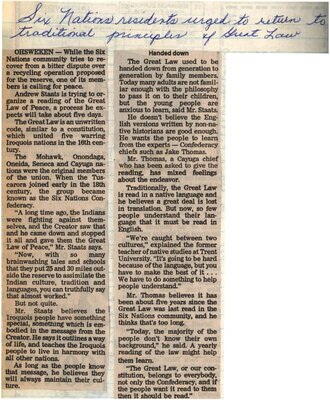"Six Nations Residents Urged to Return to Traditional Principles of the Great Law"
- Full Text
- Six Nations residents urged to return to traditional principles of Great Law
OHSWEKEN - While the Six Nations community tries to recover from a bitter dispute over a recycling operation proposed for the reserve, one of its members is calling for peace.
Andrew Staats is trying to organize a reading of the Great Law of Peace, a process he expects will take about five days.
The Great Law is an unwritten code, similar to a constitution, which united five warring Iroquois nations in the 16th century.
The Mohawk, Onondaga, Oneida, Seneca and Cayuga nations were the original members of the union. When the Tuscarora joined early in the 18th century, the group became known as the Six Nations Confederacy.
"A long time ago, the Indians were fighting against themselves, and the Creator saw that and he came down and stopped it all and gave them the Great Law of Peace," Mr. Staats says.
"Now, with so many brainwashing tales and schools that they put 25 and 30 miles outside the reserve to assimilate the Indian culture, tradition and languages, you can truthfully say that almost worked."
But not quite.
Mr. Staats believes the Iroquois people have something special, something which is embodied in the message from the Creator. He says it outlines a way of life, and teaches the Iroquois people to live in harmony with all other nations.
As long as the people know that message, he believes they will always maintain their culture.
Handed downThe Great Law used to be handed down from generation to generation by family members. Today many adults are not familiar enough with the philosophy to pass it on to their children, but the young people are anxious to learn, said Mr. Staats.
He doesn't believe the English versions written by non-native historians are good enough. He wants the people to learn from the experts - Confederacy chiefs such as Jake Thomas.
Mr. Thomas, a Cayuga chief who has been asked to give the reading, has mixed feelings about the endeavor.
Traditionally, the Great Law is read in a native language and he believes a great deal is lost in translation. But now, so few people understand their language that it must be read in English.
"We're caught between two cultures," explained the former teacher of native studies at Trent University. "It's going to be hard because of the language, but you have to make the best of it... We have to do something to help people understand."
Mr. Thomas believes it has been about five years since the Great Law was last read in the Six Nations community, and he thinks that's too long.
"Today, the majority of the people don't know their own background," he said. A yearly reading of the law might help them learn.
"The Great Law, or our constitution, belongs to everybody, not only the Confederacy, and if the people want it read to them then it should be read."
- Mystery Question
- Who is the author?[Please answer by clicking on the Comments tab]
- Media Type
- Newspaper
- Publication
- Item Types
- Articles
- Clippings
- Description
- "While the Six Nations community tries to recover from a bitter dispute over a recycling operation proposed for the reserve, one of it's members is calling for peace."
- Subject(s)
- Personal Name(s)
- Staats, Andrew ; Thomas, Jake
- Local identifier
- SNPL003265v00d
- Collection
- Scrapbook #4
- Language of Item
- English
- Geographic Coverage
-
-
Ontario, Canada
Latitude: 43.06681 Longitude: -80.11635
-
- Creative Commons licence
 [more details]
[more details]- Copyright Statement
- Public domain: Copyright has expired according to Canadian law. No restrictions on use.
- Contact
- Six Nations Public LibraryEmail:info@snpl.ca
Website:
Agency street/mail address:1679 Chiefswood Rd
PO Box 149
Ohsweken, ON N0A 1M0
519-445-2954



